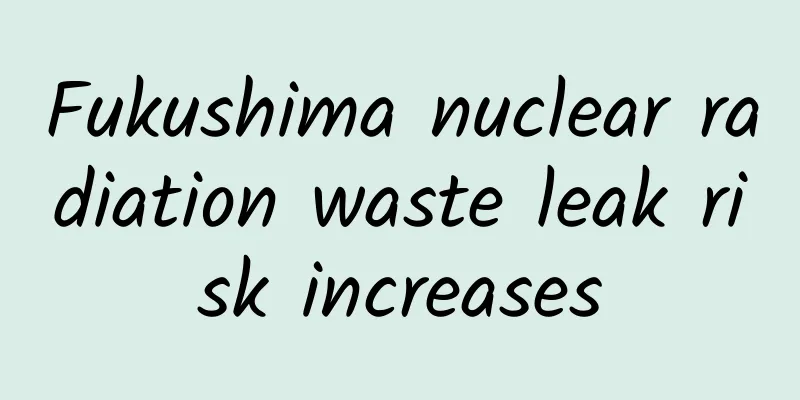Fukushima nuclear radiation waste leak risk increases

|
According to Kyodo News on August 18, the radioactive waste generated during the decontamination work at the Fukushima Daiichi Nuclear Power Plant accident at Tokyo Electric Power Company was stored in ton bags. Currently, the ton bags are seriously aged at various temporary storage sites, and have been cracked and even leaked. The cause of the deterioration is said to be the failure to use ton bags that meet the standards set by the Ministry of the Environment, and possibly improper management. If left unattended for a long time, it could cause anxiety among residents and affect the progress of decontamination work. It has been nearly three and a half years since the Fukushima nuclear accident in Japan. The Japanese government plans to move the waste to a temporary storage facility from January next year, but due to the lack of progress in negotiations with Fukushima Prefecture, the damage to the ton bags may be further exacerbated in the future. In early August, several ton bags broke at a temporary storage site in Futaba County, Fukushima Prefecture, and sand and gravel leaked out. The ton bags used in the decontamination work from September to December last year were exposed in the wild. According to industry groups, the ton bags used in the decontamination work did not meet the specifications. In addition, at other temporary stacking sites, rainwater accumulated around the non-waterproof ton bags, flowed over the water-shielding belts to the outside, and entered the ditch. In 2011, the Ministry of the Environment, with the cooperation of industry groups, established standards for storing radioactive materials for three years. The standards require the use of durable ton bags that meet the standards, but in practice, it is not uncommon for cheap, inferior products to be used instead. Shinzo Kimura, an associate professor at Dokkyo University of Medicine who serves as a decontamination consultant to local governments in Fukushima Prefecture, called for action, saying, "Three years have passed since the decontamination work began, and the aging of the bags is becoming increasingly serious. From a long-term perspective, it is undeniable that there will be impacts on health and the environment." As a winner of Toutiao's Qingyun Plan and Baijiahao's Bai+ Plan, the 2019 Baidu Digital Author of the Year, the Baijiahao's Most Popular Author in the Technology Field, the 2019 Sogou Technology and Culture Author, and the 2021 Baijiahao Quarterly Influential Creator, he has won many awards, including the 2013 Sohu Best Industry Media Person, the 2015 China New Media Entrepreneurship Competition Beijing Third Place, the 2015 Guangmang Experience Award, the 2015 China New Media Entrepreneurship Competition Finals Third Place, and the 2018 Baidu Dynamic Annual Powerful Celebrity. |
<<: The death of Qvod: the end of the era of Chinese Internet
>>: Second-hand trading website advises selling old iPhone as soon as possible
Recommend
Why is Xiaomi still valued at 100 billion US dollars after suffering a loss of 43.9 billion?
It is reported that Xiaomi has officially submitt...
"I'm afraid my father will be gone!" The young man's decision brought tears to the eyes of many netizens...
recent Bai Junlong, a young man from Xichang, Sic...
Every review causes a war of words. Is DxOMark, which gives high scores to Huawei P10's camera, reliable?
Yesterday, the famous camera evaluation organizat...
Too difficult to copy? Why don’t new Android flagships have 3D Touch?
As early as last fall, there were multiple reports...
New media operation golden title eye-catching skills!
Is the title of my article attractive to you? Obv...
up to date! Data rankings of 59 information flow advertising platforms!
The following is the latest traffic ranking of 59...
Tracking 450,000 people found that people with these 5 lifestyles live longer!
Not long ago, scholars from Peking University ana...
APP operation and promotion: 7 strategies to improve retention!
Many people think that users are retained as long...
Talk about the hidden rules of App operation
First, let’s deconstruct the position of App Oper...
Behind the rumors of acquiring a Japanese AV company: Who exactly does Wanda want to buy?
Since the suspension of trading on May 13, Wanda ...
3-point optimization of the information flow landing page instantly increased conversion by 136%!
Conversion is the core of the entire promotion pr...
Internet + door-to-door service: How to play in this market with strong demand?
Penguin Intelligence | Research and Production Re...
A must-read for women! How terrible is “corpus luteum rupture”?
The following incident happened at the Asian Game...
From 0 to 20 million, the 3-year growth path of Get APP
1. Get the PMF of the app PMF, or product-market ...
There was an earthquake in Shanghai. Is this strange?
The China Earthquake Networks Center officially d...









